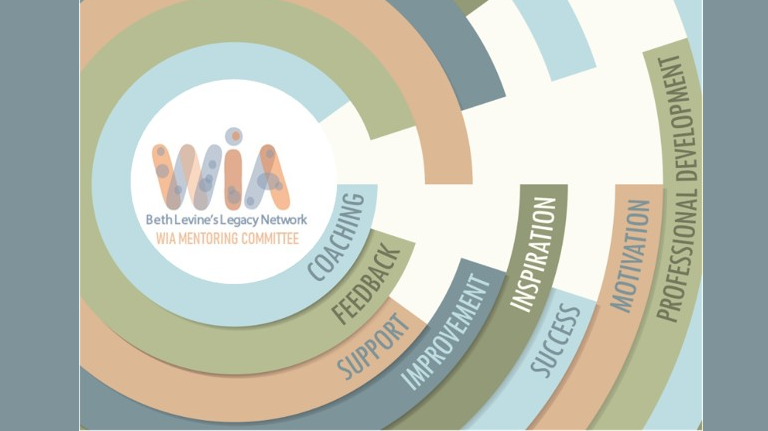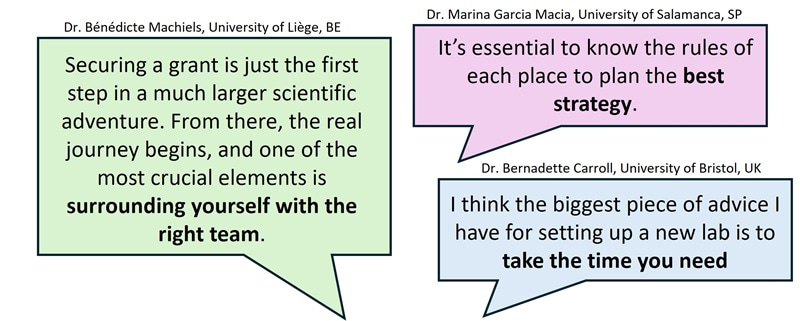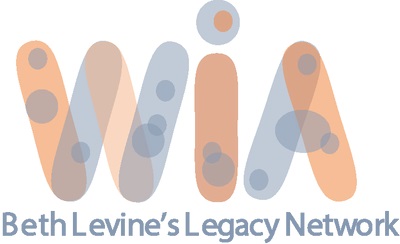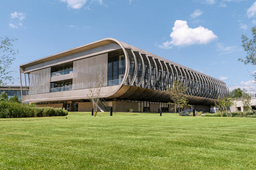Women in Autophagy: Mentoring the next generation of scientists

This post was jointly written by Muriel Mari, Natalia Jimenez Moreno, Marina Garcia Macia, Caroline Mauvezin, Alysia Vrailas-Mortimer and the Women in Autophagy (WIA) network.
In 2020, the Women in Autophagy (WIA) network was founded in memory of Professor Beth Levine, a leader in the field of autophagy. Throughout her distinguished career, Prof. Levine made groundbreaking contributions to scientific discovery while dedicating significant time and effort to mentoring and supporting researchers at all stages of their careers. To this date, her legacy continues to inspire scientists. In her honor, the Women in Autophagy (WIA) is a global network that continues this mission, to mentor, promote and empower the next generation of scientists from underrepresented backgrounds and identities in STEM. WIA serves as a dynamic platform for scientific exchange and professional development for over 1400 members, representing world-wide researchers of all genders and identities at every career stage.
WIA supports the growth of researchers by offering journal clubs, autophagy science and technology workshops, mentoring activities, and an annual symposium. Through these activities, we provide expert insights into both scientific advancements and career navigation, and offer opportunities for extensive networking within the field of autophagy and beyond. In particular, the WIA mentoring committee aims to help researchers navigate the challenges of a career in science. And for that, this committee organizes free educational workshops that have addressed key topics such as how to craft a powerful elevator statement, tips for writing a successful fellowship, how to silence imposter syndrome, master stress management, and resolve conflicts. These activities underscore WIA’s commitment to nurturing both the scientific and personal development of its community.
In early 2024, the WIA mentoring committee launched a new initiative to include tailored mentoring activities for specific geographic regions to better meet the needs of our members. Our inaugural region-specific-workshop was “Starting a Laboratory in Europe”. We were extremely fortunate to have three junior principal investigators that had recently started their lab as panelists: Dr. Bernadette Carroll from the University of Bristol, UK; Dr. Marina Garcia Macia from the University of Salamanca, SP; and Dr. Bénédicte Machiels from the University of Liège, BE. They shared the challenges they encountered when starting their own labs and how they overcame – or are still overcoming – these hurdles and are finding new opportunities for growth. Through an engaging and insightful open discussion, they offered valuable tools to help young researchers establish their own labs and research niches, in order to achieve independence. Key topics covered in the workshop included the critical steps and major challenges to focus on strategies for building partnerships and collaborations, opportunities to secure funds, and approaches for recruiting team members.
Dr. Carroll reflected on the stress and excitement of launching her lab in a new city, stressing the importance of taking time to strategically plan, rather than rushing into grant applications and recruitment. Dr. Machiels encouraged young researchers to overcome self-doubt and pursue prestigious grants by sharing her own experiences and by highlighting the importance of building a strong team that aligns on shared values. Emphasizing the importance of networking, Dr. Garcia Macia, who just started her lab in 2023, noted the enriching discussions with fellow researchers, which offered diverse perspectives on the process of setting up as a new group leader. She also underscored the need to network with administrative officials to understand local rules and regulations to develop an effective and feasible research strategy.


The feedback we received from the audience was overwhelmingly positive, emphasizing the great value and benefit of the workshop. Participants particularly appreciated the opportunity to engage with the panelists in breakout rooms, where they were able to have more open, informal and in-depth discussions.
Our next WIA mentoring event is a workshop on “Lab Philosophy: Effective Communication by Defining Expectations Across Career Stages” at the 5th Annual WIA Symposium Webinar (October 28-29, 2024). Our panelists Ms. Carene Anne Ndong Sima (PhD student at Stellenbosch University, South Africa); Dr. Phong Nguyen (Post-doctoral fellow at University of Texas Southwestern, US); Dr. Yasin Dagdas (Junior principal investigator at Austrian Academy of Sciences, AT); and Dr. Sharon Tooze (Senior PI at the Francis Crick Institute, UK) will discuss how they set and communicate expectations in a laboratory setting as they move through their careers.
All the events organized by WIA are free, and all are welcome to attend. Registration for the workshop comes with a free WIA membership and provides full access to all our year-around activities in mentoring, scientific advice, including a library of recorded WIA events, the WIA blog, and a wide range of exciting opportunities to connect and grow within our international and dynamic network. Therefore, we encourage interested researchers from any background to join us and we hope that these workshops can help guide them in their careers.
The WIA mentoring committee is currently chaired by Dr. Alysia Vrailas-Mortimer (Oregon State University, USA) and Dr. Caroline Mauvezin (University of Barcelona, SP) and our European Mentoring subcommittee is Dr. Muriel Mari (chair, Aarhus University, DK), Dr. Natalia Jimenez Moreno (co-chair, University of Edinburgh, UK), Dr. Nathalia Chica Balaguera (Norwegian Hospital University, NO), Dr. Ghita Ghislat (University of Cambridge, UK) and Dr. Naomi Okugbeni (Stellenbosch University, ZA).

All images by the Women in Autophagy (WIA) network.





Join the FEBS Network today
Joining the FEBS Network’s molecular life sciences community enables you to access special content on the site, present your profile, 'follow' contributors, 'comment' on and 'like' content, post your own content, and set up a tailored email digest for updates.